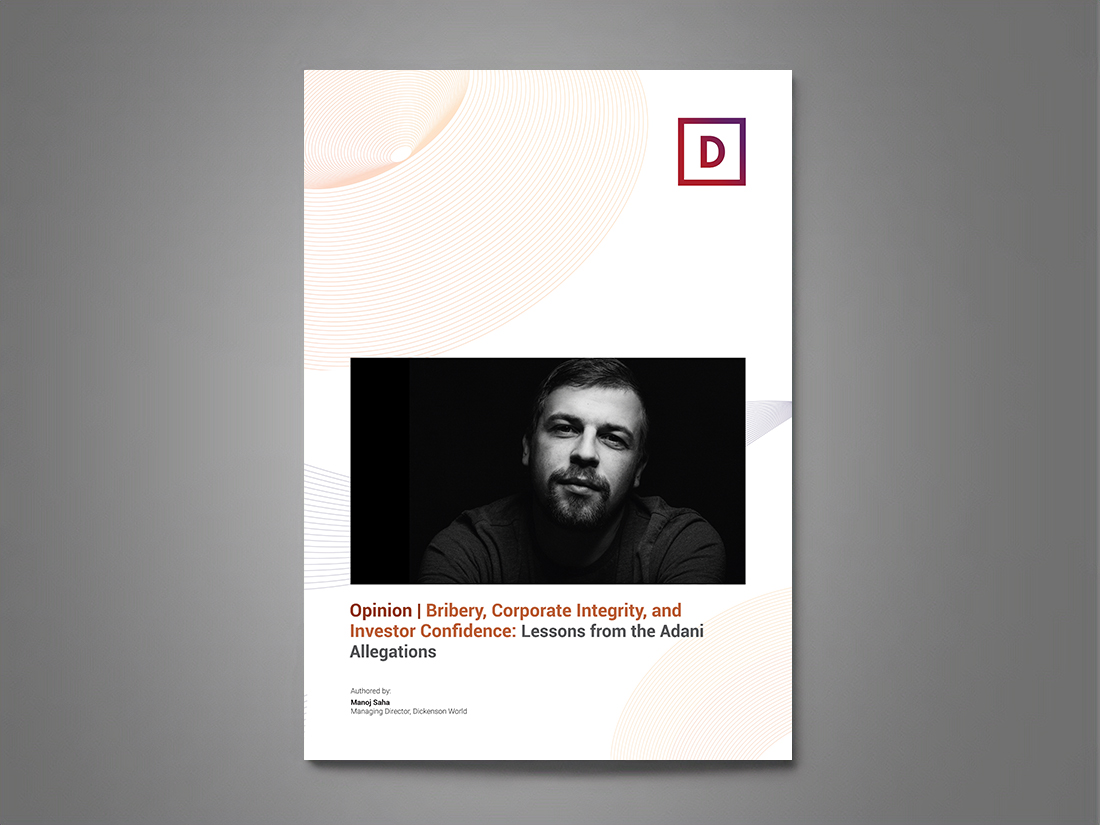Opinion | Bribery, Corporate Integrity, and Investor Confidence:
Lessons from the Adani Allegations
When allegations surfaced that Adani Group entities had engaged in bribery to secure port contracts in the United States, the story quickly transcended its specifics. This wasn’t just about a company’s alleged misconduct it was a spotlight on a larger tension that defines modern global capitalism: the conflict between corporate integrity, market realities, and the expectations of investors. In markets where systemic corruption is seen as an open secret, companies face a vexing dilemma. How do you succeed without compromising on ethics? For multinational corporations, this isn’t just a rhetorical question. It’s a strategic one, and its answers carry profound implications for investors, stakeholders, and the future of corporate governance.
The Bribery Paradox
India, where the Adani Group is headquartered, is often ranked low on global corruption indices. Yet it is also home to one of the world’s fastest-growing economies. The juxtaposition creates a paradox: companies must navigate regulatory complexities and bureaucratic inefficiencies while still delivering results to shareholders. In such an environment, the temptation—or perceived necessity—to circumvent obstacles through bribery can be strong.
However, the long-term costs of such shortcuts are staggering. Allegations like those against Adani expose companies to significant legal and reputational risks. Under laws such as the U.S. Foreign Corrupt Practices Act (FCPA), bribery allegations can lead to multimillion-dollar fines, restricted market access, and years of regulatory scrutiny. For investors, this translates into heightened risks and potential financial losses.
More importantly, allegations of corruption strike at the heart of trust—the currency of investor relations. Investors expect transparency, accountability, and adherence to global norms, particularly from companies aspiring to lead on the world stage. When trust erodes, so does market confidence.
The Investor’s Dilemma
For investors, the Adani case raises a pressing question: Can companies truly succeed in complex markets while maintaining impeccable ethical standards? This is especially pertinent in emerging markets, where systemic corruption often seems baked into the regulatory landscape.
Investors are not naïve. They understand the challenges of operating in such environments. But they also recognize that unethical practices—however widespread—are not without consequences. Companies that rely on bribery risk alienating ESG-focused funds, facing regulatory crackdowns, and irreparably damaging their reputations. The short-term gains often pale in comparison to the long-term fallout
This reality is driving a growing investor focus on governance—the often-overlooked pillar of Environmental, Social, and Governance (ESG) criteria. Governance lapses, such as bribery, are increasingly viewed as leading indicators of broader organizational risk. For investors, they are red flags that can no longer be ignored.
Corporate Integrity: A Competitive Advantage?
In an ironic twist, markets riddled with corruption may present opportunities for differentiation. Companies that can demonstrate a genuine commitment to ethical practices—through robust compliance frameworks, transparent reporting, and strong governance—can position themselves as outliers. For such companies, integrity becomes not a liability but a competitive advantage
Take the rising demand for ESG-compliant investments as an example. Global ESG assets are projected to surpass $50 trillion by 2025. For companies seeking access to this capital, governance is non-negotiable. Adopting and communicating clean practices can attract premium investors, reduce the cost of capital, and build resilience against crises.
The Adani case underscores this point. Allegations of bribery not only risk alienating ESG funds but also tarnish the broader perception of Indian corporate governance. For India’s economy to maintain its momentum, its leading companies must set the tone by embracing global standards of integrity. Anything less could jeopardize the country’s standing in the global capital markets.

The Role of Investor Relations
This is where the often-overlooked function of Investor Relations (IR) comes into play. IR professionals are uniquely positioned to bridge the gap between companies and their investors during crises like the Adani allegations. By ensuring consistent, transparent, and timely communication, they can help rebuild trust, clarify the company’s stance, and outline the corrective measures being taken.
Crises like these also offer an opportunity for companies to reevaluate their governance frameworks. For IR teams, integrating governance improvements into the company’s broader ESG narrative is not just advisable—it is essential. Silence or vague statements in the face of bribery allegations only amplify investor concerns, leading to share price volatility and reputational harm.
What Next?
The Adani case is not an isolated incident. It is a cautionary tale for companies operating in environments where corruption is a systemic challenge. While the allure of bribery may be strong, its costs are too great to ignore. For multinational corporations, the path to sustainable success lies not in shortcuts but in transparency, accountability, and integrity.
For investors, the lesson is equally clear. Governance must be front and centre in the evaluation of companies, particularly in high-risk markets. By demanding higher standards and rewarding ethical practices, investors can drive a shift toward better corporate behaviour.
In the end, trust is what drives markets. Without it, even the most ambitious growth stories risk unravelling. The Adani case is a reminder that integrity is not just a moral imperative; it is a strategic one.
Contact Us: To learn more or schedule a consultation, please reach out to us at www.dickensonworld.com
Email:enquiry@dickensonworld.com.
About the Author
Manoj Saha is the Managing Director of Dickenson World, a leading Capital Markets Communication solutions company. He leads Dickenson World in Investor Relations, Corporate Reporting and ESG Advisory.

Opinion | Bribery, Corporate Integrity, and Investor Confidence
To download and save this article.
Authored by:
Manoj Saha
Managing Director, Dickenson World
Visit www.dickensonworld.com to learn more about our services and how we can help streamline your corporate reporting process.


Leave A Comment